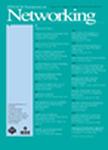版权所有:内蒙古大学图书馆 技术提供:维普资讯• 智图
内蒙古自治区呼和浩特市赛罕区大学西街235号 邮编: 010021

作者机构:Univ Florida Dept Elect & Comp Engn Gainesville FL 32608 USA
出 版 物:《IEEE TRANSACTIONS ON NETWORKING》
年 卷 期:2025年第33卷第2期
页 面:583-594页
核心收录:
学科分类:0810[工学-信息与通信工程] 0808[工学-电气工程] 08[工学] 0812[工学-计算机科学与技术(可授工学、理学学位)]
基 金:NSF [2033681 2006630 2044991 2319780]
主 题:Qubit Quantum entanglement Resource management Routing Quantum channels Quantum mechanics Computers Teleportation Optimization Stochastic processes path selection qubit allocation multi-armed bandits
摘 要:Quantum Data Networks (QDNs) have emerged as a promising framework in the field of information processing and transmission, harnessing the principles of quantum mechanics. QDNs utilize a quantum teleportation technique through long-distance entanglement connections, encoding data information in quantum bits (qubits). Despite being a cornerstone in various quantum applications, quantum entanglement encounters challenges in establishing connections over extended distances due to probabilistic processes influenced by factors like optical fiber losses. The creation of long-distance entanglement connections between quantum computers involves multiple entanglement links and entanglement swapping techniques through successive quantum nodes, including quantum computers and quantum repeaters, necessitating optimal path selection and qubit allocation. Current research predominantly assumes known success rates of entanglement links between neighboring quantum nodes and overlooks potential network attackers. This paper addresses the online challenge of optimal path selection and qubit allocation, aiming to learn the best strategy for achieving the highest success rate of entanglement connections between two chosen quantum computers without prior knowledge of the success rate and in the presence of a QDN attacker. The proposed approach is based on multi-armed bandits, specifically adversarial group neural bandits, which treat each path as a group and view qubit allocation as arm selection. Our contributions encompass formulating an online adversarial optimization problem, introducing the EXPNeuralUCB bandits algorithm with theoretical performance guarantees, and conducting comprehensive simulations to showcase its superiority over established advanced algorithms.